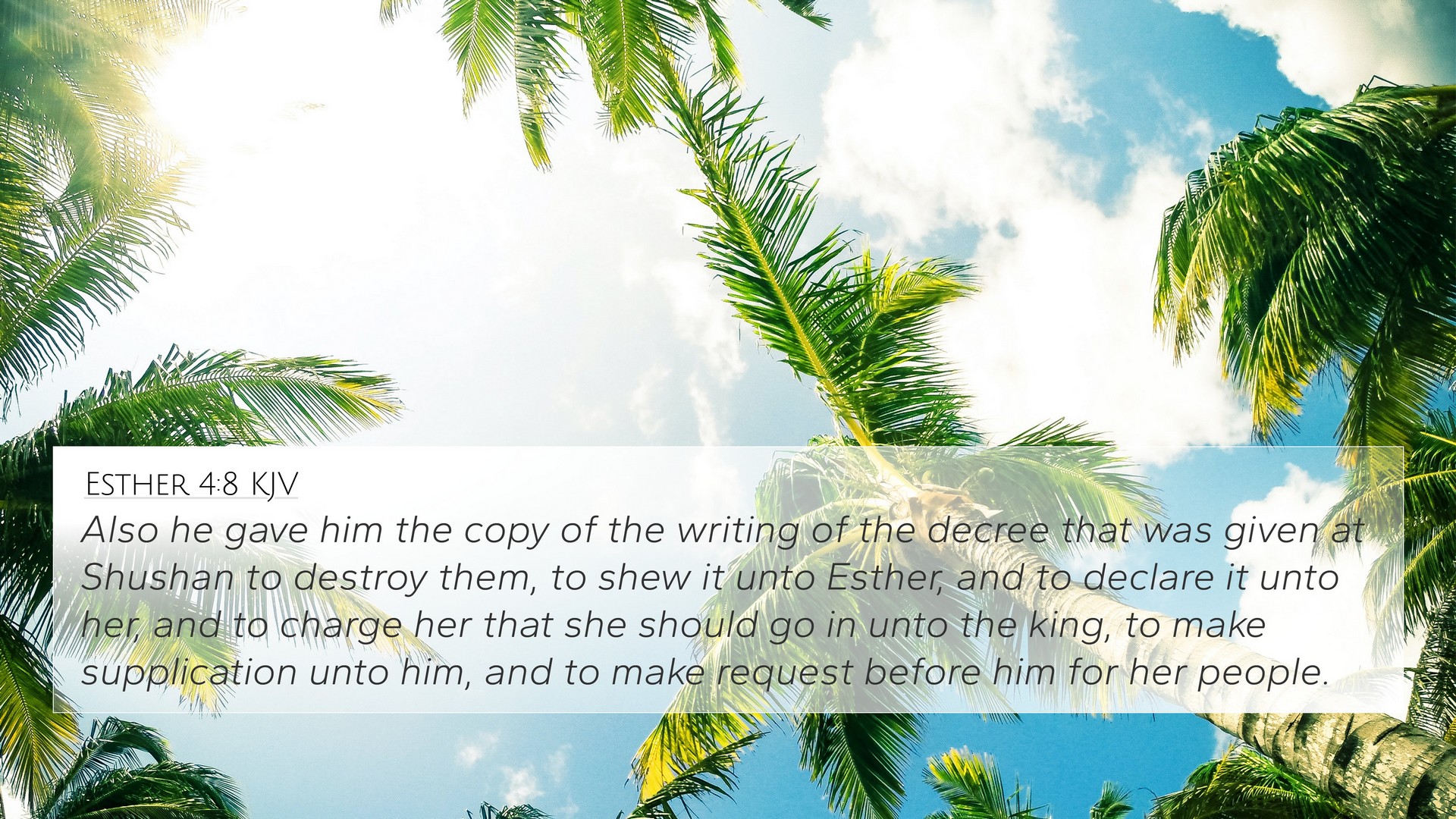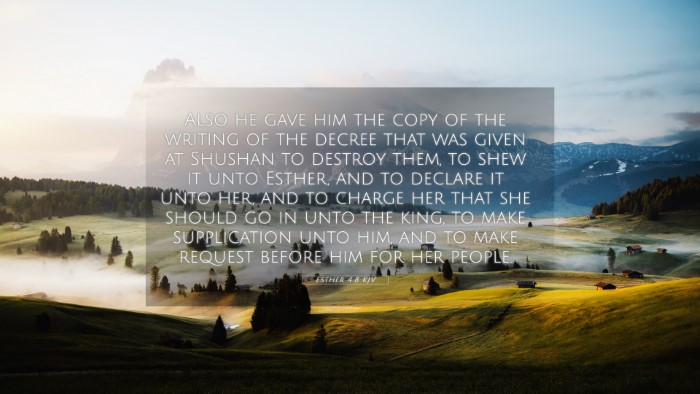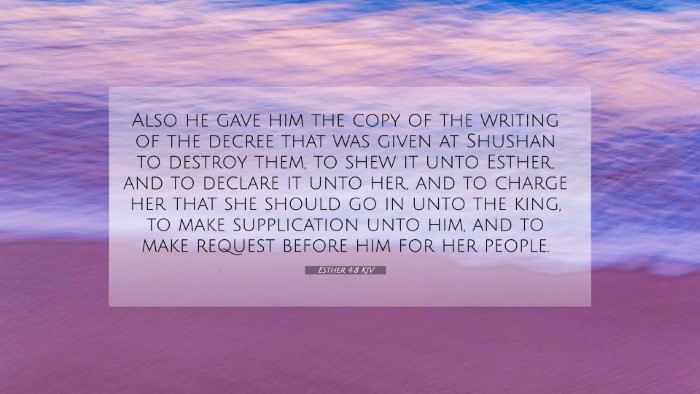Old Testament
Genesis Exodus Leviticus Numbers Deuteronomy Joshua Judges Ruth 1 Samuel 2 Samuel 1 Kings 2 Kings 1 Chronicles 2 Chronicles Ezra Nehemiah Esther Job Psalms Proverbs Ecclesiastes Song of Solomon Isaiah Jeremiah Lamentations Ezekiel Daniel Hosea Joel Amos Obadiah Jonah Micah Nahum Habakkuk Zephaniah Haggai Zechariah MalachiEsther 4:8 Similar Verses
Esther 4:8 Cross References
Also he gave him the copy of the writing of the decree that was given at Shushan to destroy them, to shew it unto Esther, and to declare it unto her, and to charge her that she should go in unto the king, to make supplication unto him, and to make request before him for her people.
Uncover the Rich Themes and Topics of This Bible Verse
Listed below are the Bible themes associated with Esther 4:8. We invite you to explore each theme to gain deeper insights into the Scriptures.
Esther 4:8 Cross Reference Verses
This section features a detailed cross-reference designed to enrich your understanding of the Scriptures. Below, you will find carefully selected verses that echo the themes and teachings related to Esther 4:8 KJV. Click on any image to explore detailed analyses of related Bible verses and uncover deeper theological insights.
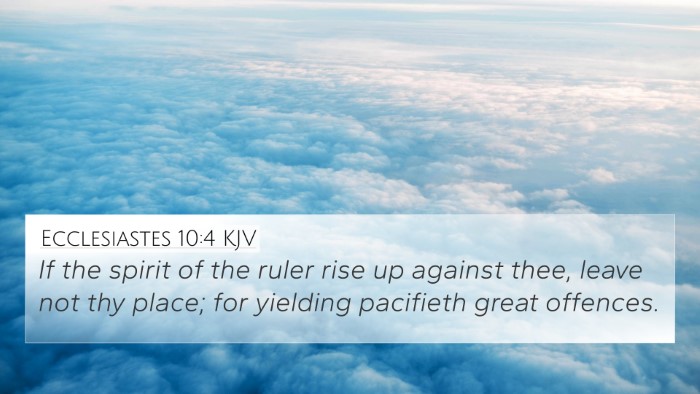
Ecclesiastes 10:4 (KJV) »
If the spirit of the ruler rise up against thee, leave not thy place; for yielding pacifieth great offences.
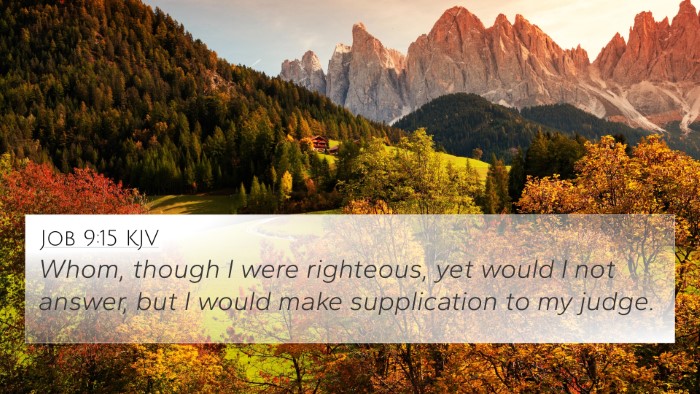
Job 9:15 (KJV) »
Whom, though I were righteous, yet would I not answer, but I would make supplication to my judge.
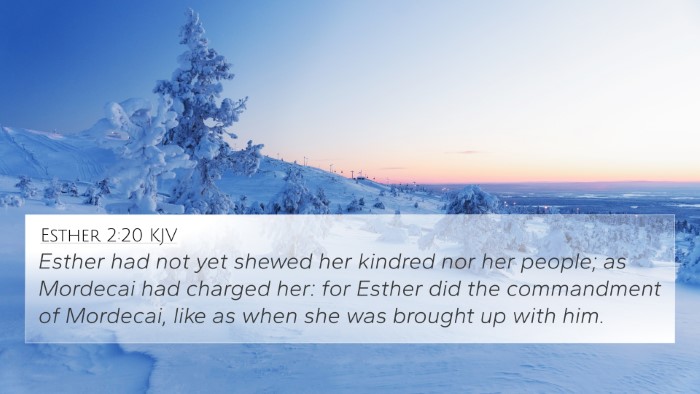
Esther 2:20 (KJV) »
Esther had not yet shewed her kindred nor her people; as Mordecai had charged her: for Esther did the commandment of Mordecai, like as when she was brought up with him.
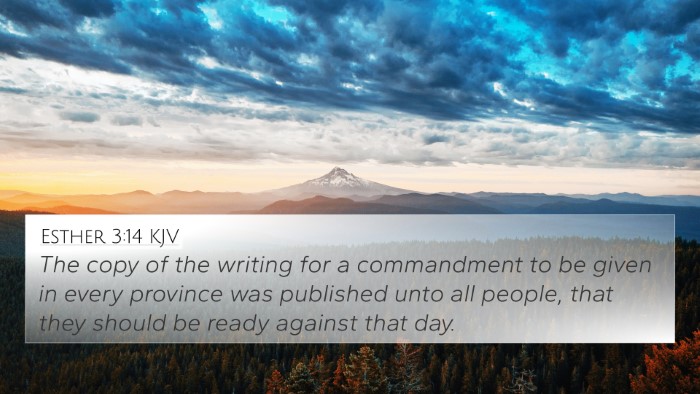
Esther 3:14 (KJV) »
The copy of the writing for a commandment to be given in every province was published unto all people, that they should be ready against that day.
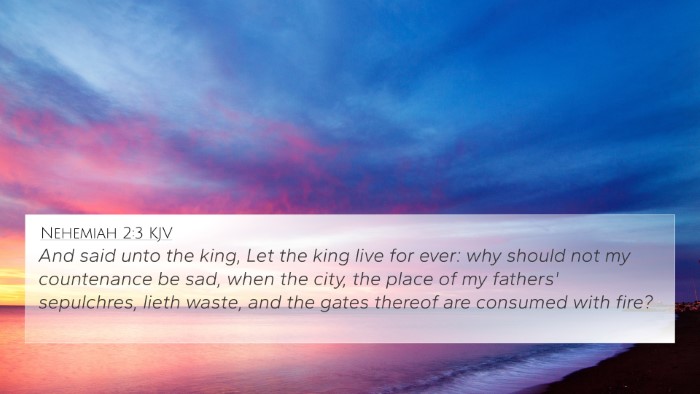
Nehemiah 2:3 (KJV) »
And said unto the king, Let the king live for ever: why should not my countenance be sad, when the city, the place of my fathers' sepulchres, lieth waste, and the gates thereof are consumed with fire?
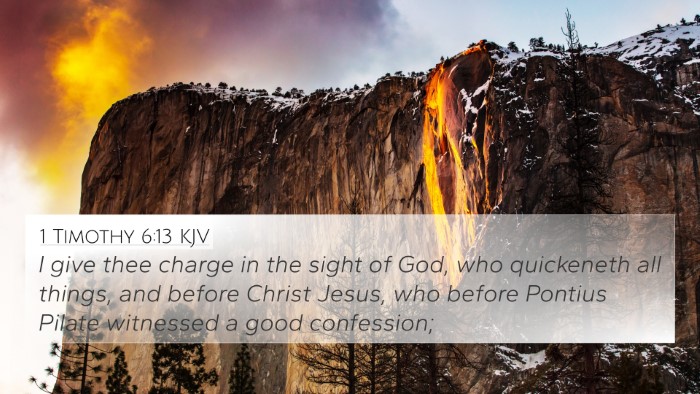
1 Timothy 6:13 (KJV) »
I give thee charge in the sight of God, who quickeneth all things, and before Christ Jesus, who before Pontius Pilate witnessed a good confession;
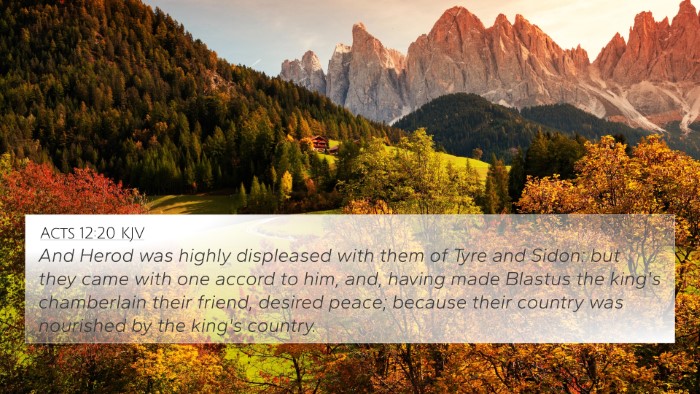
Acts 12:20 (KJV) »
And Herod was highly displeased with them of Tyre and Sidon: but they came with one accord to him, and, having made Blastus the king's chamberlain their friend, desired peace; because their country was nourished by the king's country.
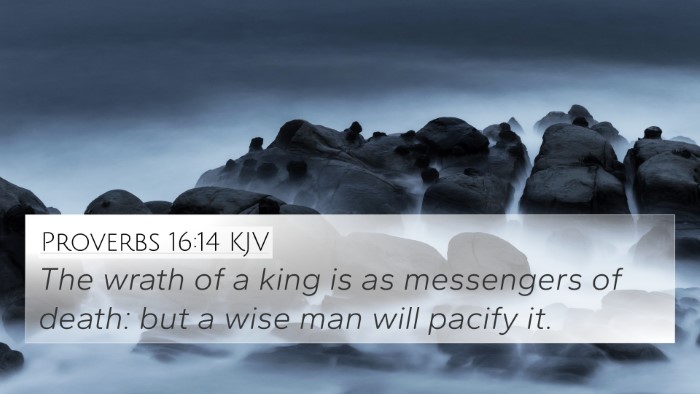
Proverbs 16:14 (KJV) »
The wrath of a king is as messengers of death: but a wise man will pacify it.
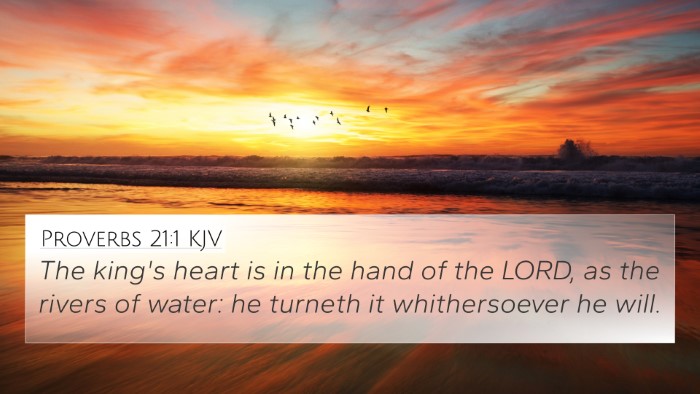
Proverbs 21:1 (KJV) »
The king's heart is in the hand of the LORD, as the rivers of water: he turneth it whithersoever he will.
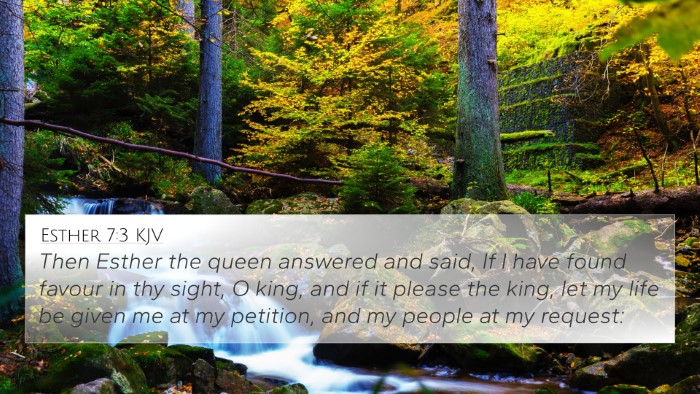
Esther 7:3 (KJV) »
Then Esther the queen answered and said, If I have found favour in thy sight, O king, and if it please the king, let my life be given me at my petition, and my people at my request:
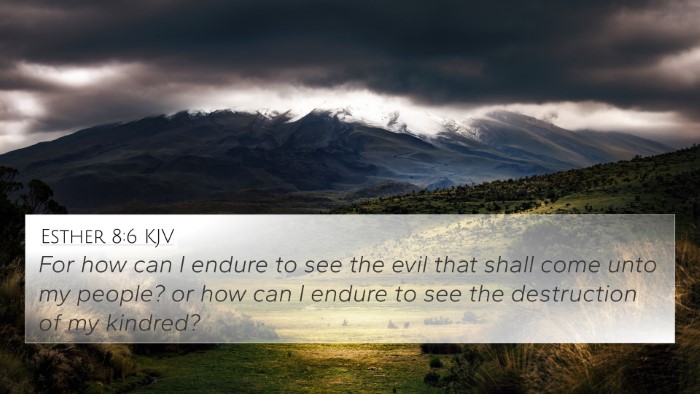
Esther 8:6 (KJV) »
For how can I endure to see the evil that shall come unto my people? or how can I endure to see the destruction of my kindred?
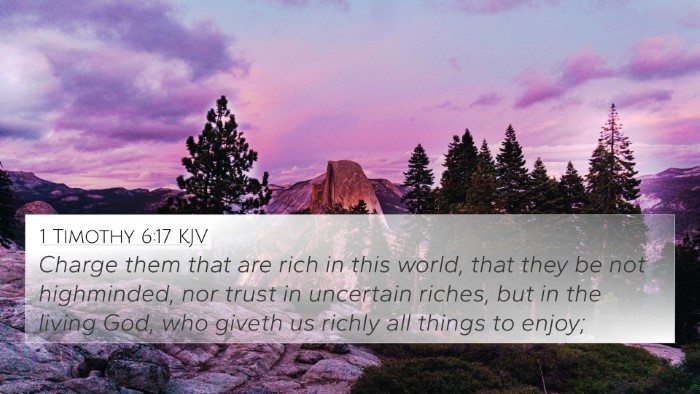
1 Timothy 6:17 (KJV) »
Charge them that are rich in this world, that they be not highminded, nor trust in uncertain riches, but in the living God, who giveth us richly all things to enjoy;
Esther 4:8 Verse Analysis and Similar Verses
Understanding Esther 4:8
Esther 4:8 states: “He also gave him a copy of the written decree of the king, and he communicated it to Esther in order to inform her and to command her to go to the king to implore his favor and plead with him for her people.” This verse captures the pivotal moment in the Book of Esther where Mordecai instructs Esther to intercede for her people, the Jews, who are under threat of annihilation.
Contextual Significance
This verse is set against the backdrop of impending doom for the Jewish people due to Haman's decree. Esther, who has become queen, is called upon to use her influence to avert disaster. The necessity of her intervention highlights themes of courage, identity, and divine providence.
Analysis from Public Domain Commentaries
Combining insights from Matthew Henry, Albert Barnes, and Adam Clarke, we discern several layers of interpretation for Esther 4:8:
-
The Role of Mordecai:
Mordecai's role is crucial; he acts as a mentor to Esther, emphasizing the importance of communication in times of crisis. As per Matthew Henry, Mordecai's appeal to Esther represents not only a familial bond but also a call to responsible action.
-
The Urgency of the Situation:
According to Albert Barnes, the urgency in Mordecai's command reflects the dire circumstances facing the Jewish community. Esther’s hesitation could lead to catastrophic consequences, thereby illustrating the weight of leadership and the importance of timely action.
-
The Call to Action:
Adam Clarke emphasizes that Esther’s potential reluctance to approach the king captures a relatable human fear of inadequacy and rejection. However, this fear must be overcome for the greater good, embodying the theme of personal sacrifice.
-
Divine Providence:
Mordecai’s faith in God’s providence is implicit in his instructions. He believes that Esther may have risen to her royal position “for such a time as this” (Esther 4:14), underscoring the idea that God orchestrates events for specific purposes.
Bible Verse Cross-References
Esther 4:8 is richly connected to several other scriptures, indicating the thematic depth of this narrative:
- Esther 4:14: Highlights Mordecai’s belief in God’s plan for Esther.
- Daniel 2:21: Discusses God’s sovereignty in the rise and fall of rulers, paralleling Esther’s situation.
- Proverbs 21:1: Illustrates that the king’s heart is in the hand of the Lord, supporting the theme of divine direction.
- 1 Samuel 25:29: Provides an example of an intercessor, showcasing parallels in the defense of one’s people.
- Luke 12:11-12: Encourages reliance on the Holy Spirit, similar to Esther's need for divine guidance in her plea.
- Romans 8:28: Affirms that God orchestrates all things for the good of those who love Him, resonating with the eventual outcome for Esther’s people.
- Philippians 4:13: Introduces the encouragement to act despite challenges, akin to Esther’s situation.
- Jeremiah 29:11: Speaks to God’s plans for His people, echoing Mordecai’s confidence in a hopeful future.
Thematic Connections
Esther 4:8 reflects broader themes found throughout the Bible:
- Courage in Adversity: Esther is faced with a life-threatening scenario, akin to Daniel in the lions’ den (Daniel 6).
- Intercession for Others: Similar to the prayers of Anna in Luke 2, Esther is called to advocate for her people.
- God’s Sovereignty: The sovereignty of God, as seen in the lives of Joseph (Genesis 50:20) and Nehemiah (Nehemiah 2), echoes through Esther’s predicament.
Tools for Bible Cross-Referencing
For a deeper understanding and exploration of the connections between Bible verses, consider the following tools:
- Bible Concordance: A reference tool that helps locate words and verses in the Bible.
- Bible Cross-Reference Guide: Provides alternative verses and themes related to specific passages.
- Bible Chain References: A system that connects verses thematically, enhancing study and understanding.
- Cross-Referencing Bible Study Methods: Various methodologies to explore the Scripture across multiple contexts.
Conclusion
Esther 4:8 serves as a critical reminder of the importance of courage, faith, and action in the face of adversity. By recognizing the interconnectedness of this verse with other biblical texts, believers can draw strength and inspiration from God’s Word, unraveling the beauty of cross-referencing biblical themes.
